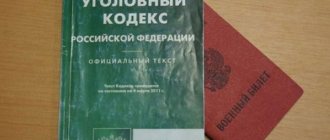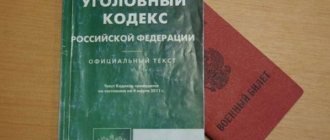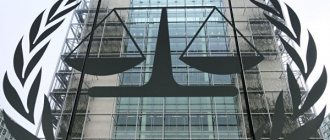Justice means a separate form of activity of authorized state bodies, expressed in the resolution of cases in the manner of general jurisdiction. In order to administer justice, individual government agencies and institutions may also provide support to the court.
But according to the law, justice itself in Russia can only be administered by the court. Unfortunately, some citizens and legal entities deliberately interfere with normal legal proceedings, for example, by not providing evidence. For such cases, liability for crimes against justice is provided.
The concept of crimes against justice, their types
Features of the crime
According to the norms of Russian legislation, the administration of justice directly depends on the actions of a number of government bodies that work closely with the court. In particular, such institutions include:
- Prosecutor's office.
- Inquiry bodies.
- Investigative committee.
The success of solving a particular case directly depends on the quality of work performed at all stages of production. Therefore, any crimes that violate the functioning of the justice system are suppressed. In particular, they provide for criminal liability.
Qualification of crimes and their composition
Crimes that are committed against normal judicial proceedings, as a rule, have a formal composition. Accordingly, an action can be considered completed only at the moment when the guilty person has obstructed the administration of justice and the normal work of a judicial or investigative body.
Separate parts of the Criminal Code provide for the material composition of this criminal act.
Object and objective side of the crime
The main object of an unlawful act committed against justice is the interests of legal proceedings in the broad sense of the word.
That is, this concept includes the functioning of the court and other authorized state bodies, whose activities are aimed at implementing the tasks of justice. Therefore, the main objects are:
- Interests of bodies carrying out judicial activities.
- Interests of bodies that contribute to the implementation of normal judicial activities.
In addition, the legislation separately identifies additional objects, which include:
- Health and life.
- Honor and dignity.
- Freedom.
- Property relations.
As practice shows, in most cases the crime contains a special subject of the unlawful act.
Objective side of the crime
In most cases, the objective signs of almost all criminal acts against the administration of justice are characterized by certain active actions. The only exceptions are cases established by law (for example, when a witness to a crime refuses to testify, or a convicted person evades imprisonment or otherwise fails to comply with court decisions).
Mandatory objective signs of illegal acts in this area include:
- The place where the criminal act was committed.
- Method of committing a crime.
- The instrument with which the illegal act was committed.
- The setting and time of the crime.
The subjective side of the act
According to the norms of Russian legislation, sane individuals who have reached the age of 16 can act as subjects of crimes against justice.
However, according to the law, special subjects who are endowed with special characteristics by law may participate in certain crimes. One of them is a subject who has a certain procedural status, for example, a judge, prosecutor, investigator, who does not fulfill his official duties, thereby preventing normal legal proceedings in the case.
The subjective signs of such an unlawful act are characterized by the following:
- Presence of intentional guilt (as a rule, such crimes are committed with direct intent).
- Certain articles of the Criminal Code also provide for the possibility of committing such an unlawful act with certain motives and goals.
Classification of acts against justice
Crimes directed against the implementation of constitutional principles of justice
The Criminal Code of the Russian Federation provides for the possibility of bringing a person guilty of committing an unlawful act to criminal liability if such a criminal in any way interferes with normal legal proceedings.
Such interference can be carried out in any form, the main thing is that as a result normal legal proceedings in the case are impossible.
According to the law, when carrying out their activities, judges are subject to the Constitution of the Russian Federation and current legislation. Otherwise, they are independent, so the actions of the perpetrators undermine the provisions on the independence of members of the judiciary, which affects their authority.
Attention! The immediate object of such illegal actions is the interests of justice.
Crimes that are aimed at the activities of justice and law enforcement agencies in accordance with the goals and objectives assigned to them
One of the main criminal acts that is aimed at carrying out activities by the judiciary is contempt of court.
The immediate objects of such a crime are:
- Interests of justice.
- Legal activities of the court.
- Interests of judges.
Additional objects of the crime: the honor and dignity of the participants in the trial.
At the legislative level, it is defined that insults mean deliberate humiliation of human honor and dignity, which is expressed in an indecent form. This can happen directly in the courtroom, or during the trial of the case.
Crimes that are aimed at violating the procedural procedure for obtaining evidence in a case
One of the main crimes that can arise when obtaining evidence in a case is coercion to give evidence.
Such illegal acts mean: coercion of a suspect, accused, victim, or witness to testify; expert - to give an opinion on one of the circumstances of the case.
Such crimes can be committed through direct threats, blackmail, and other types of illegal actions on the part of persons who carry out an investigation as an inquiry or investigation.
The motives for such an illegal act can be varied.
Another category of illegal acts in this area is falsification of evidence in a case. Such a crime may be committed by a person who is directly involved in the consideration of the case, or by his representative.
Encroachments on the activities of law enforcement agencies aimed at the timely suppression and detection of crimes
The timely suppression of a criminal act or its disclosure is, first of all, hindered by the concealment of a crime. The norms of criminal law determine that such an act means concealment of an unlawful act that was not promised in advance.
Accordingly, the direct object of such a crime is the normal activity of the court and investigative bodies. The interests of citizens can be considered as additional objects.
A crime can be considered completed only after a person deliberately began to conceal the fact of committing a crime of a serious or especially serious degree.
In cases where concealment of a criminal act is committed by an official, he is subject to more severe penalties.
Crimes encroaching on relations arising during the implementation of a judicial act
According to the norms of Russian legislation, malicious failure to comply with a court verdict, committed by a representative of a government body, state or municipal employee, entails bringing the guilty person to criminal liability.
Download for viewing and printing: Chapter 31 of the Criminal Code of the Russian Federation
To the detriment of the interests of justice
April 7, 2022 4:25 pm
Lawyers were told about the features of corruption crimes against justice
On April 7, during the regular webinar of the Federal Law Firm of the Russian Federation on advanced training for lawyers, a candidate of legal sciences, director of MaTIK LLC, gave a lecture on the topic “Crimes against justice with a corruption orientation.” Yakovlev and Partners,” Associate Professor of the Department of Criminal Law of the Moscow State Law University named after O.E. Kutafina (MSAL) Anastasia Ragulina.
At the beginning of her speech, Anastasia Ragulina reminded the audience that the crimes in question include: obstruction of justice and the conduct of a preliminary investigation (Article 294 of the Criminal Code of the Russian Federation); encroachment on the life of a person administering justice or preliminary investigation (Article 295 of the Criminal Code of the Russian Federation); threat or violent actions in connection with the administration of justice or the conduct of a preliminary investigation (Article 296 of the Criminal Code of the Russian Federation); coercion to testify (Article 302 of the Criminal Code of the Russian Federation); falsification of evidence and results of operational investigative activities (parts 2 and 4 of Article 303 of the Criminal Code of the Russian Federation); issuing a knowingly unjust sentence, decision or other judicial act (Article 305 of the Criminal Code of the Russian Federation); knowingly false testimony, conclusion of an expert, specialist or incorrect translation (Article 307 of the Criminal Code of the Russian Federation); bribery or coercion to give evidence or evasion to give evidence or incorrect translation (Article 309 of the Criminal Code of the Russian Federation). During the webinar, the lecturer described each element of the crime separately and gave examples from judicial practice.
Anastasia Ragulina noted that the joint Directive of the Prosecutor General's Office of the Russian Federation and the Ministry of Internal Affairs of Russia dated July 12, 2022 No. 487/11 “On the implementation of lists of articles of the Criminal Code of the Russian Federation used in the formation of statistical reporting,” among others, also establishes a list of corruption-related crimes ( list No. 23).
The speaker highlighted a number of signs of corruption crimes against justice. Firstly, these crimes are directed against justice in a broad sense; their subjects are judges and law enforcement officials. Secondly, the connection of the act with the official position of the subject or its procedural status must be traced, and the powers granted to the subject must be used contrary to the interests of justice. Thirdly, the act must be committed only with direct intent, on the basis of selfish motivation or other personal interest.
The expert clarified that the prevalence of selfish motivation in such crimes is confirmed by judicial practice. So, according to N.V. Romanenko, about 80% of judges’ crimes related to their professional activities have a selfish purpose. “The fact that there is no mention of mercenary or other personal interest in the design of the offenses does not allow the corruption factor to be properly taken into account when resolving issues of criminal liability,” she added.
Anastasia Ragulina drew attention to the fact that the wording of the dispositions of Art. 303 of the Criminal Code of the Russian Federation (falsification of evidence and results of operational investigative activities) does not take into account the possibility of commission of relevant acts by judges and a number of other law enforcement officials not specified in this article of the Criminal Code of the Russian Federation. At the same time, as the expert noted, falsification of evidence committed by a judge certainly causes greater harm to the interests of justice than a similar crime committed by a participant in civil or criminal proceedings.
There are also no provisions for the specific criminal liability of judges for bribery or coercion of participants in the process, in particular, for the purpose of giving false testimony or conclusions under Art. 309 of the Criminal Code of the Russian Federation. “As judicial practice shows, this is one of the smallest groups of crimes in terms of the number of convicts. This is explained by the complexity of proving such criminal attacks in criminal cases, errors made in the qualification of these acts, as well as the imperfection of criminal law prohibitions in the area of encroachment on the interests of justice,” the lecturer explained.
Anastasia Ragulina focused on the aspect of the relationship between official crimes and crimes against justice. According to her, in law enforcement practice many questions arise related to the delimitation of crimes against justice from other crimes that encroach on justice as an additional object. These acts are primarily directed against the interests of the civil service (bribery, negligence, etc.) or against the order of management (for example, forgery of documents).
The expert emphasized that committing crimes against justice may involve bribery of relevant court officials and other law enforcement agencies. For example, illegal exemption from criminal liability by the investigator issuing a resolution to terminate a criminal case for a bribe; interference in the administration of justice involving the offer or transfer of a bribe to a judge. In such cases, the act should be qualified according to the totality of crimes provided for in Art. 290 and 300, part 1 art. 294 of the Criminal Code of the Russian Federation. At the same time, as an analysis of judicial practice shows, most often the actions of officials who have committed crimes in the field of justice involving bribery in office are qualified only as receiving a bribe (Article 290 of the Criminal Code of the Russian Federation).
Speaking about the victim in the crimes under consideration, Anastasia Ragulina drew attention to the fact that in Chapter 31 of the Criminal Code of the Russian Federation the legislator does not provide for the concept of “lawyer”; instead, the concept of “defender” is used. In Art. 294, 295, 296 and 298.1 of the Criminal Code of the Russian Federation establishes criminal legal protection for the activities of professional participants in legal proceedings. For example, the prosecutor is called a prosecutor, not a state prosecutor. “It turns out that the prosecutor, unlike the lawyer, is protected by the legislator during his work in all cases, and not just criminal ones. Moreover, the activities of a lawyer today are not adequately protected in comparison with other participants in legal proceedings, which today cannot be considered fair and correct,” says Anastasia Ragulina. She recalled that Part 2 of Art. 294 of the Criminal Code of the Russian Federation establishes criminal liability for interference in any form in the activities of a prosecutor, investigator or person conducting an inquiry in order to impede a comprehensive, complete and objective investigation. At the same time, this article does not provide for criminal liability for unlawful interference in the activities of a lawyer for the same purposes.
You can view the lecturer's presentation here. You can find out the answers to the questions asked to Anastasia Vyacheslavovna in the file at the link.
Anna Storozhenko
SharePrint Direct link to the material:
Share







